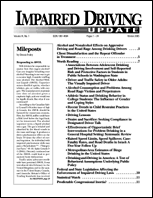Worth Reading
Author: Stacy Calhoun .
Source: Volume 21, Number 01, Winter 2017 , pp.7-11(5)

< previous article |next article > |return to table of contents
Abstract:
Each issue of Impaired Driving Update surveys important research findings bearing on drunk and drugged driving. This issue’s “Worth Reading” reviews: “Can a Criminal Justice Alcohol Abstention Programme With Swift, Certain, and Modest Sanctions (24/7 Sobriety) Reduce Population Mortality? A Retrospective Observational Study” by Nancy Nicosia, Beau Kilmer, & Paul Heaton, the authors examined differences in the alcohol-related mortality rates over a 12-year period between counties in South Dakota that have implemented the 24/7 Sobriety Program and those that have not; “A Comparison of the Cellphone Driver and the Drunk Driver” by David Strayer, Frank Drews, & Dennis Crouch, using a driving simulator, the authors of this article conducted a study that compared the driving ability of cellphone users with drivers who were intoxicated from alcohol; “Specialty Courts: Who’s In and Are They Working ?” by Robert Morgan, Sean Mitchell, Megan Thoen, Kelsey Campion, Angelea Bolanos, Michael Sustaita, & Steven Henderson, the authors assessed the referral practices of three types of specialty courts (drug courts, DUI/DWI courts, and re-entry courts) to determine if there is any bias in the referral process; “Relationship of Aggression, Negative Affect, Substance Use Problems, and Childhood Delinquency to DWI Recidivism” by Braden Linn, Thomas Nochasjski, & William Wieczorek, the authors of this article examined how aggression, negative affect, substance use problems, and childhood delinquency are related to repeat DUI/DWI offending; and “Don’t Cry While You’re Driving: Sad Driving Is as Bad as Angry Driving” by Myounghoon Jeon, the study described in this article examined the effect that sadness had on driving performance during a simulated driving experience.Keywords: number of alcohol-related deaths; negatively affected driving performance; specialty court programs compared to standard probation; aggressive and risky driving behaviors
Affiliations:
1: University of California, Irvine.